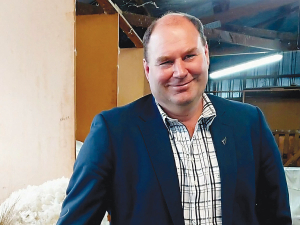Ray Smith: Dairy still has growth potential despite flat export outlook
Ministry for Primary Industries (MPI) Director General Ray Smith believes there is potential for an increase in dairy farming in New Zealand.
 Biosecurity Minister Andrew Hoggard says the plan will provide farmers with a one-stop shop for disease management and traceability.
Biosecurity Minister Andrew Hoggard says the plan will provide farmers with a one-stop shop for disease management and traceability.
A national pest management plan to eradicate Mycoplasma bovis (M. bovis) will come into effect by the end of this year.
The plan, approved by the Coalition Government, was proposed by the programme partners DairyNZ, Beef + Lamb New Zealand, and the Ministry for Primary Industries (MPI). It will shift M bovis accountability from MPI to OSPRI.
Biosecurity Minister Andrew Hoggard says this is a hard-fought step forward for farmers and will provide them with a one-stop shop for disease management and traceability.
OSPRI works with the farming industry to manage animal disease and provides the National Animal Identification Tracing system.
“The move will help take advantage of efficiencies and protect our investment in eradication made to date,” Hoggard says.
“The eradication was estimated to cost $870 million in 2018, a significant investment in our farming sector from the Crown and farmers, who have contributed 32% of the funding.
“It is important we protect this investment and the hard work of all involved, including the sacrifices made by farmers, by ensuring the fit-for-purpose M. bovis Plan is implemented.
“At present we have no infected farms, and we are focused on the national surveillance of cattle. There’s more to do before we reach the end of this journey, and it is possible we will find more infection before we get there but the move to a national pest management plan is another big step forward.
“The plan will ensure that OSPRI has the tools needed to continue to build on the success achieved.
“I want to thank DairyNZ and Beef + Lamb New Zealand for their support. The partnership approach has set this response apart and is a great example of how government and industry working together can achieve better results for all. but most of all I want to recognise the intense stress and emotional toll that has been felt by the farmers that have been caught up in this response”.
M. bovis stats
A buoyant farm economy should make for a successful 2026 Southern Field Days, says chairman Steve Henderson.
OPINION: November 7 has been set by Christopher Luxon as ‘E day’ – election day.
The strong wool market has improved in the past six months, despite drops in production over recent years.
On January 5th at Te Pa Station, the World Sheep Shearing Records saw a new nine-hour strong wool ewes shearing record set by Simon Goss.
Recently awarded in the New Years Honours List for Services to Agriculture and Governance, well known dairy farmer Lloyd Downing has become an Officer of the New Zealand Order of Merit (ONZM).
International trade expert Stephen Jacobi says Winston Peters' objections to the Indian free trade deal are "ridiculous".

OPINION: Your old mate has long dismissed the Greens as wooden bicycle enthusiasts with their heads in the clouds, but…
OPINION: After seven years of Adrian Orr’s antics as Reserve Bank NZ governor, the priority of his successor, Anna Breman,…